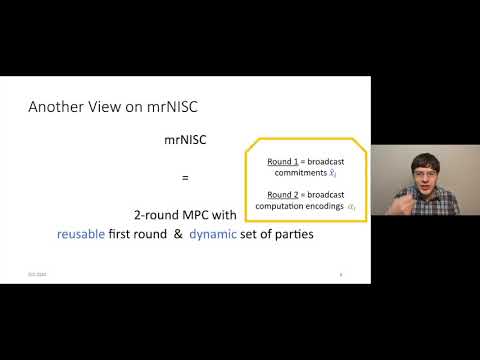CryptoDB
Mr NISC: Multiparty Reusable Non-Interactive Secure Computation
| Authors: | |
|---|---|
| Download: | |
| Abstract: | Reducing interaction in Multiparty Computation (MPC) is a highly desirable goal in cryptography. It is known that 2-round MPC can be based on the minimal assumption of 2-round Oblivious Transfer (OT) [Benhamouda and Lin, Garg and Srinivasan, EC 2018], and 1-round MPC is impossible in general. In this work, we propose a natural ``hybrid'' model, called \emph{multiparty reusable Non-Interactive Secure Computation (mrNISC)}. In this model, parties publish encodings of their private inputs $x_i$ on a public bulletin board, once and for all. Later, any subset $I$ of them can compute \emph{on-the-fly} a function $f$ on their inputs $\vec x_I = {\{x_i\}}_{i \in I}$ by just sending a single message to a stateless evaluator, conveying the result $f(\vec x_I)$ and nothing else. Importantly, the input encodings can be \emph{reused} in any number of on-the-fly computations, and the same classical simulation security guaranteed by multi-round MPC, is achieved. In short, mrNISC has a minimal yet ``tractable'' interaction pattern. We initiate the study of mrNISC on several fronts. First, we formalize the model of mrNISC protocols, and present both a UC security definition and a game-based security definition. Second, we construct mrNISC protocols in the plain model with semi-honest and semi-malicious security based on pairing groups. Third, we demonstrate the power of mrNISC by showing two applications: non-interactive MPC (NIMPC) with reusable setup and a distributed version of program obfuscation. At the core of our construction of mrNISC is a witness encryption scheme for a special language that verifies Non-Interactive Zero-Knowledge (NIZK) proofs of the validity of computations over committed values, which is of independent interest. |
Video from TCC 2020
BibTeX
@article{tcc-2020-30637,
title={Mr NISC: Multiparty Reusable Non-Interactive Secure Computation},
booktitle={Theory of Cryptography},
publisher={Springer},
author={Fabrice Benhamouda and Huijia Lin},
year=2020
}

